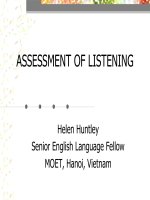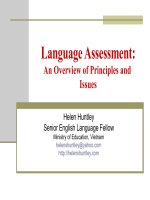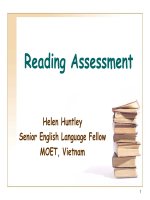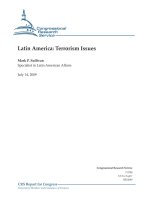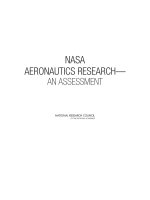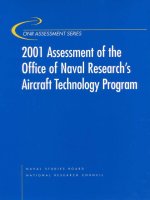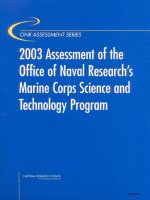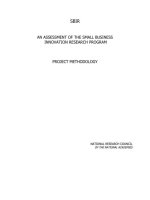ASSESSMENT ISSUES
Bạn đang xem bản rút gọn của tài liệu. Xem và tải ngay bản đầy đủ của tài liệu tại đây (183.26 KB, 19 trang )
Language Assessment:
An Overview of Principles and
Issues
Helen Huntley
Senior English Language Fellow
Ministry of Education, Vietnam
Overview
Part I
What is meant by ‘assessment’?
What are the traditional/alternative methods of
assessment?
What are the basic principles of assessment?
How does washback influence the curriculum?
Learners’ motivation etc.?
Part II
What role does assessment have in language teaching
in Vietnam?
What kind of assessment best suits Vietnam?
What are the testing issues in Vietnam?
Part I
Assessment can…
increase motivation by serving as milestones of student
progress.
aid in the reinforcement and retention of information
confirm areas of strength and pinpoint areas needing further
work.
provide a sense of periodic closure to modules within a
curriculum.
promote student autonomy by encouraging student self-
evaluation of their progress.
encourage learners to set goals for themselves
aid in evaluating teaching effectiveness
Brown, D.H. (2004). Language assessment: Principles and classroom practices. Longman.
Curriculum and Assessment
“Assessment is an integral part of the
entire curriculum cycle, not something
tacked on as an afterthought to
teaching.”
Coombe, C., Folse, K., & Hubley, N. (2007). Assessing English Language Learners. Univ. of Michigan Press.
Evaluation/Assessment/Testing
Evaluation
All the factors that influence the
teaching/learning process
Assessment
A variety of ways of collecting information on
a learner’s ability or achievement
Testing
One type of assessment: a formal, systematic
way to gather information about students’
behavior
Assessment Options
conferences peer assessments
portfolios
quick quiz formal test
written assignment
oral presentation
self-assessment
peer assessment
‘can do’ checklists
observations
What is a test?
A measurement of a person’s
ability
knowledge
(specific) competence
“A test is a method of measuring a
person’s ability or knowledge in a given
domain”
Brown, D.H. (2001). Teaching by principles. Longman.
